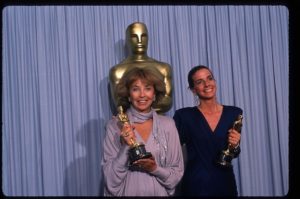News Stories

Behind the Camera in Detroit and Beyond
Filmmaker Sue Marx has Emmys and an Academy Award to her name, and as her new collection at the Bentley shows, she’s never forgotten her roots in Detroit or the truth about what makes a good story.
by Davi Napoleon
A woman loses her mother. A year later, her father begins to date again. Some daughters might find it difficult to see their dad in a new romance, but not Sue Marx. She was compelled to share his love affair with the world.
Young at Heart chronicled the relationship of Marx’s father, Lou, age 84, and Reva, age 83, two widowed artists who met on a painting trip to England. “We began working on the film when they were dating,” Marx recalls. As filming continued, Reva asked Lou to move in with her, which he did. Within a year, Reva asked Lou to marry her. And unexpectedly, Marx found a surprise ending to her film.

Sue Marx (left) and Pamela Conn and hold their Oscars for Best Documentary, Short Subject for ‘Young at Heart’ at the Academy Awards in 1988. Photo by John T. Barry/Getty Images
The only glitch? Reva didn’t want the wedding filmed—she wanted a perfect garden wedding unmarred by an unsightly crew. The crew was reduced to a camera man and a sound man who were told they needed to wear suits, says Marx, who was able to convince the bride that she wouldn’t even notice them.
Young at Heart was broadcast on PBS, BBC, CBC, and The Learning Channel(TLC)—and as far away as Russia, Australia, Singapore, and New Zealand. In 1987 it won an Academy Award for Best Short Documentary.
It was a great success for Marx, who had been producing award-winning films since 1980, and it certainly wouldn’t be the last, as evidenced in the collection Marx recently donated to the Bentley Historical Library. Her materials provide researchers with just about everything that is part of making a film, including budgets, correspondence related to fundraising, permissions to reuse material from other sources, interviews, transcripts, and raw footage.
Nobody Knows the Story
Marx learned her craft on the job, as an associate producer for Detroit’s Channel 4 (WDIV) series Profiles in Black about the personal and professional lives of such notables as Coleman Young, Rosa Parks, Marvin Gaye and Stevie Wonder. The series launched soon after the devastating Detroit Riots in 1967, and was shot on location, throughout the city, every Tuesday and Thursday. The award-winning series aired weekly from 1969-76.
In 1980, Marx established her own company, Sue Marx Films (SMF), in Detroit. She has created films on a range subjects including portraits of local artists and their work, the Detroit People Mover, business in Detroit, living in Detroit, and the Detroit Jewish community—just to name a few. She’s also been commissioned to create films, including one about a 1908 race car, Old 16, which was produced for the Henry Ford Museum and starred Paul Newman, as well as a film about the Chandler-Pohrt collection of Native American Art for the Detroit Institute of Arts.
“One of the important things for any filmmaker is to have a curiosity about something and the ability to ask questions and listen,” she says.
These days, “Everybody has a phone that can shoot video,” Marx says. A professional, however, “approaches every film with the notion that nobody knows the story.” Often, she is among those who don’t know. “It’s always a big education for me when I start with a subject I plainly know nothing about.”
Make Films, Not Money
A few years ago, at a dinner at Wayne State University (WSU), Marx found herself drawn into a story idea. Two WSU math professors had developed The Math Corps, a program that gives junior high, high school, and college students a chance to take advanced courses while mentoring young Detroit students in lower grades. They created a six-week summer math camp on WSU’s campus, and by 2008, 31,000 students from 44 states had participated, and many had gone on to college.
Marx’s film about the Math Corps became It All Adds Up, which aired in several major cities and also won an Emmy.
Marx says she owes much of her success over all these years to her late husband, Stanley (“Hank”) Marx, owner of an automotive supply company, who encouraged her. Marx recalls Stanley saying, “You’re good, honey; just make films even if they don’t make money.”
A Great Time in Detroit
Marx was born in New York City and lived in Wisconsin, then northern Indiana. She moved to Detroit, met her future husband, Hank, and they raised three daughters in the city. Detroit is where she launched her career and she often documented the city that became her home.
Her 1988 film Encore on Woodward celebrated the 1988 restoration of the Fox Theatre. Marx researched the theater, digging deep into its history: Who played there during the Depression when vaudeville acts and chorus girls opened for the featured film? Who might share a memory? Where might she get raw footage? The result is a mix of on-camera interviews with celebrities and former audience members and ushers, still photos and film clips, and on-camera narration by Bob Hope. Encore on Woodward also won Marx another Emmy.
Her Emmy-winning 1989 film, Art in the Stations: Detroit People Mover gave viewers an inside look at the planning and installation of 15 public works at 13 stations.
Marx created a series of films for the Detroit Zoo that were shown at the zoo (1995-2001) and another series about Cranbrook School (1997-2004).

Sue Marx in Detroit in 2015. Photo by Glenn Triest.
When Detroit celebrated its 300th birthday, Marx was commissioned to do several public service spots. A list of locations to shoot found in the Bentley archives includes the Detroit skylight at night, an ice cream parlor, a Northwest plane taking off from Detroit Metropolitan Airport, the Eastern Market, the Belle Isle Zoo, and more. Marx acquired footage from TV stations, dug up newspaper headlines for major events, added music, and edited it all down. It’s a Great Time in Detroit won a 1998 Emmy in the category Best PSA.
In 2005, Marx looked back to 1952, when General Motors engineers partnered with scientists and physicians at Harper Hospital in Detroit to develop a mechanical heart and perform the first open-heart surgery. Marx and her staff interviewed lab technicians, physicians, and engineers who had been involved, read articles in medical journals and newspapers and related correspondence, and they watched video tapes of operations. Transcripts of these interviews and all the research material are in the Bentley collection. And she added a 2005 Emmy for A Heart to Heart Partnership to her substantial awards.
Never a Dull Moment
Marx continues to make an impact on the film world in Michigan and beyond, but she’s “been phasing out the daily grind of managing crews.” Instead, she’s become something of a matchmaker, finding stories, suggesting them to other producers, helping to raise funds.
For example, she recently discovered a boxing gym near Detroit’s Eastern Market. “ I don’t like boxing,” she says; but still, she found the organization housed there, Books Before Boxing, movie-worthy. She’s helped with fundraising for a film about how inner city kids are given the chance to discover the sport of reading, but she turned most of the project over to another producer.
She’s also continuing to sort through the photos she took, some of them portraits of prominent jazz musicians, others chronicling political events that marked the turbulent 1960s. When she completes labeling these photos, they will become part of her Bentley collection.
A voting member in the documentary branch of Academy of Motion Picture of Arts and Sciences, Marx chalks up her success up to this: “It takes chutzpah, curiosity, not being afraid to ask questions, and—most importantly—listening.”
